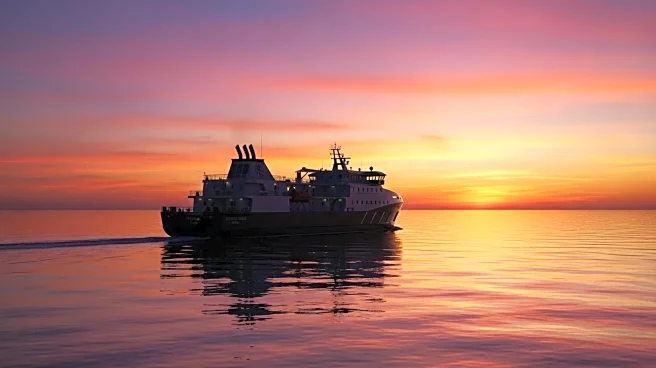What's Happening?
Maersk is conducting trials on a new fuel blend, E10, which consists of 10 percent ethanol mixed with methanol, to address the supply challenges of alternative fuels. The trial is being carried out on the Laura Maersk, a 2,100 TEU methanol dual-fuel feeder ship operating in the Baltic region. This vessel has been running on methanol for three years without issues, making it an ideal test ground for new fuel concepts. The trial aims to gather data on ignition quality, fuel burning characteristics, corrosion, lubricity, and emissions, particularly NOx emissions, to evaluate the feasibility of using E10 in larger vessels.
Why It's Important?
The trial is crucial as it explores solutions to the limited availability of methanol, a key challenge in the adoption of alternative fuels in the shipping industry. By potentially expanding the sourcing pool of methanol through the use of ethanol, Maersk could enhance the sustainability and operational efficiency of its dual-fuel fleet. This initiative reflects the industry's ongoing efforts to reduce emissions and transition to greener fuel options. Success in this trial could pave the way for broader adoption of ethanol-methanol blends, influencing fuel strategies and environmental policies within the maritime sector.
What's Next?
Maersk will analyze the data from the E10 trial to assess its impact on the operation of larger vessels. If the results are positive, the company may consider implementing the blend across its fleet, including the newly introduced large dual-fuel methanol containerships. The findings could also inform future fuel development and regulatory discussions within the industry. Stakeholders, including environmental groups and regulatory bodies, will likely monitor the outcomes closely, as they could have implications for emissions standards and fuel sourcing strategies.
Beyond the Headlines
The trial highlights the broader shift towards sustainable practices in the shipping industry, as companies seek to balance operational needs with environmental responsibilities. The use of ethanol, a renewable resource, in fuel blends could contribute to reducing the carbon footprint of maritime operations. Additionally, the trial underscores the importance of innovation and collaboration in addressing global challenges such as climate change and resource scarcity.









